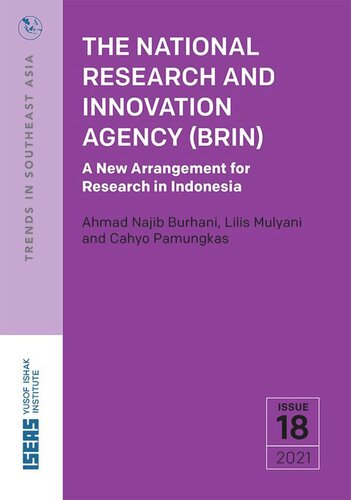

Most ebook files are in PDF format, so you can easily read them using various software such as Foxit Reader or directly on the Google Chrome browser.
Some ebook files are released by publishers in other formats such as .awz, .mobi, .epub, .fb2, etc. You may need to install specific software to read these formats on mobile/PC, such as Calibre.
Please read the tutorial at this link: https://ebookbell.com/faq
We offer FREE conversion to the popular formats you request; however, this may take some time. Therefore, right after payment, please email us, and we will try to provide the service as quickly as possible.
For some exceptional file formats or broken links (if any), please refrain from opening any disputes. Instead, email us first, and we will try to assist within a maximum of 6 hours.
EbookBell Team

4.1
40 reviewsOn 28 April 2021, the Indonesian government, under President Joko Widodo, dissolved the Ministry of Research, Technology, and Higher Education (Kemenristek-Dikti). Since then, the management of higher education has been taken over by the Ministry of Education and Culture, while research and innovation are now the responsibility of the National Research and Innovation Agency (Badan Riset dan Inovasi Nasional, or BRIN).
Based on Presidential Regulation (Perpres) Nos. 33 and 78 of 2021, various research institutes, such as LIPI, BATAN, LAPAN and BPPT, and research agencies in some ministries have been or will be merged into BRIN, making it a “super-government agency” with an “overarching” role.
With a Rp26 trillion budget allocated by the government for research per year and with a large number of researchers, BRIN is expected to boost national research and innovation, and help the country catch up with countries such as Singapore and South Korea.
BRIN, however, faces some serious challenges. It is not related to budget, infrastructure or human resources, but to the research ecosystem and research culture of Indonesia. Technocratism, which has been restricting research in the country, will be its first challenge. Politicization of research institutions as indicated by the involvement of political parties in research supervision is another issue. Achieving an environment that makes good and healthy research possible built around an effective system of funding, academic rewards, and a vibrant academic community, will be the third challenge.
If BRIN manages to overcome these challenges sufficiently, it will be in a good position to enhance the capacity and competence of Indonesian researchers as the foundation for an advanced Indonesia by 2045.